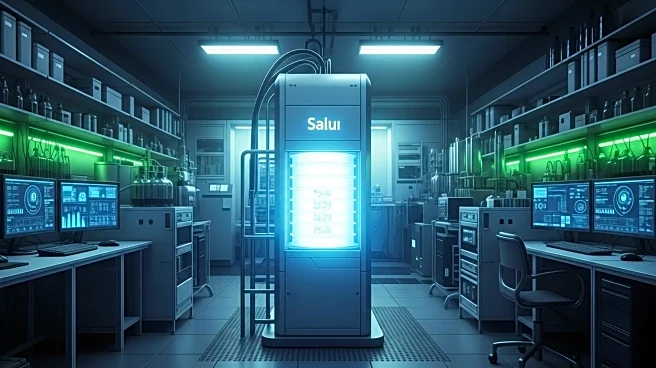What's Happening?
The closure of Natron, a sodium battery firm, has resulted in the loss of 1,000 factory jobs and posed a setback for renewable energy stakeholders relying on low-cost battery solutions for wind and solar storage. Despite this, Inlyte, another U.S. energy storage startup, is progressing with its sodium-iron battery formula. Inlyte plans to begin domestic production, partnering with Swiss company HORIEN Salt Battery Solutions. The U.S. Department of Energy has supported Inlyte with a $4 million grant through the CiFER program to develop and demonstrate a long-duration energy storage system at the Alliance Redwoods site in California. This project aims to enhance energy resilience, particularly in wildfire-prone areas, by integrating a sodium-iron battery system with a solar array.
Why It's Important?
The closure of Natron highlights challenges in the renewable energy sector, particularly in advancing energy storage technologies. However, Inlyte's continued efforts underscore the importance of developing alternative energy storage solutions. Sodium batteries offer advantages such as non-toxicity and cost-effectiveness, which are crucial for long-duration energy storage. Inlyte's project at Alliance Redwoods demonstrates the potential for sodium-iron batteries to provide reliable backup power, reduce electricity costs, and enhance resilience against natural disasters. This development is significant for communities and industries seeking sustainable energy solutions, potentially reducing reliance on traditional energy sources and promoting energy independence.
What's Next?
Inlyte plans to replicate the Alliance Redwoods model in other locations, aiming to expand the use of sodium-iron batteries for energy storage. The company has strengthened its leadership team with former executives from Tesla and GE Energy Storage, indicating a shift from technology development to commercial-scale production. Inlyte is also collaborating with Southern Company on a utility-scale version of its technology, with installation expected in Birmingham, Alabama, by the end of the year. An evaluation period will follow, with results shared across a utility network in collaboration with the Electric Power Research Institute (EPRI), potentially paving the way for broader adoption of sodium energy storage solutions.
Beyond the Headlines
The transition to renewable energy storage solutions like sodium batteries reflects broader shifts in energy policy and technology. As traditional energy sources face environmental and economic challenges, innovations in energy storage are crucial for achieving sustainability goals. Sodium batteries, with their long-duration capabilities, could play a key role in supporting grid resilience and reducing carbon emissions. The involvement of influential organizations like EPRI in evaluating these technologies suggests a growing recognition of their potential impact on the energy landscape, potentially influencing future energy policies and investment strategies.









